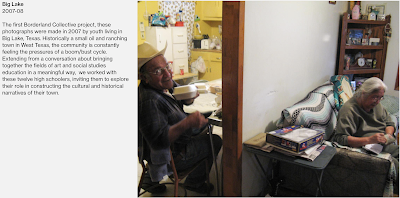Deeper Learning Workshop - Seek Nuance: Teaching in Polarising Times (Ryan Sprott - PBL Works)
 |
| Source: https://borderlandcollective.org/ |
If there is one thing to say about the Deeper Learning Conference it is that the conference and workshop design is exceptional. From the kick-off on the field that felt more like High School Musical graduation than PD, to the way they establish a conference whānau, made up of a smaller group of around 25 educators, who you meet up with throughout the three days. The group is the same people who signed up for the Deep Dive topic we are doing today (on Day 2) which ensures we also have some common interests.
The workshop we did in the afternoon of Day 1 was a 90-minute session the topic of which we selected from around 30 options. To be honest, it was near impossible to choose just one session. Each session had to be clearly designed to ensure active participation rather than just any kind of stand-and-deliver. The session I went to was a fantastic example of how to engage adult learners whilst also modelling great classroom teaching. Not surprising when you consider the facilitator Ryan Sprott is one of the senior leaders at PBL Works.
Workshop - Seek Nuance: Teaching in Polarising Times (Ryan Sprott - PBL Works)
You can read more about Ryan here: https://www.pblworks.org/author/ryan-sprott-0
And you can read more about PBL Works here: https://www.pblworks.org/
Ryan shared with us a student project he had facilitated prior to working for PBL Works, it was, as he described it, one of those "sticky learning experiences" that was transformative for both teachers and students alike. The project looked at a complex issue that was deeply contextualised for his Texan students - the border between USA and Mexico. Ryan was quick to point out that the topic wasn't something teachers could lift and plop into their classroom, he stressed the importance of whatever they were dealing with being deeply contextualised and immediately relevant to the community in which the student was situated. He also highlighted the importance of complexity and going beyond anything binary. He stated what many of us already know, complex issues are where the deepest learning takes place.
The really transferable learning that I took away from this workshop was the four tenets of the project learning design below.
The Four Tenets
A question to open minds
- Focus on a maximally contentious topic
- Invite dialogue from different perspectives
- Provide checks to teachers' biases
- Challenge underlying assumptions
Dialogue as action
- Don't debate. Use dialogue instead.
- Develop and ask inquiry-driven questions
- Interrogate perspectives through structured, equitable, student-driven dialogue.
- Amplify underrepresented perspectives
Art as Inquiry
- Look closely
- Celebrate and exhibit the process over product
- Embrace ambiguity
- Create, curate, and archive new knowledge
Assessment for Liberation
- Focus on skills
- Co-define goals
- Focus on metacognition
 |
| Source: https://borderlandcollective.org/ |


Comments
Post a Comment